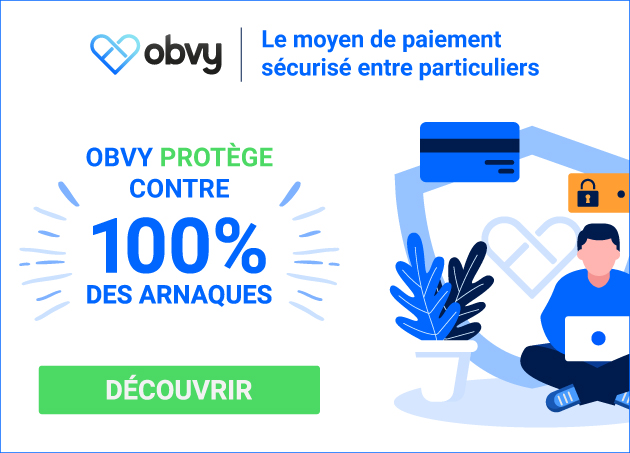How can I protect myself from PayPal scams on classified ad sites?
You've probably heard of it: the notorious PayPal scam! It is very common on sites for buying and selling between individuals, such as Leboncoin or Facebook, and takes advantage of the trust and knowledge that users have of this means of payment to lure victims and swindle them light-heartedly. Discovering a scourge in the world of of classified ads.
Everyone knows PayPal, and the scammers have got it down pat. This scam is almost as old as the ad sites themselves, and is still claiming victims despite numerous warnings in the media and from PayPal itself.
Find out how to protect yourself in less than 3 minutes by watching our video on scams that hijack the PayPal brand:
Want to find out more? Read the full article below
A well-oiled scam mechanism
The scammer's approach is similar to that of the Money Order scam, i.e. a text message asking you to continue discussions by email by writing to an address given in the message, as in this example of a fraudulent text message:

As in most cases, a quick visit to the Bescherelle website wouldn't have done any harm... In this case too, if you ask them to call them, they'll either tell you they're abroad, deaf or mute. As email exchanges are absolutely essential for them, others will say that they have run out of SMS credit to continue writing.
Once the discussion has started by email, the scammer will ask for the transaction to be carried out using PayPal's payment solution, for reasons of ease and security. So far so good, except that PayPal is far from ideal for transactions between individuals. But scammers know how to be inventive and will simply promote a PayPal feature that, in reality, simply doesn't exist!
A fake PayPal feature invented by scammers
Payment by PayPal is instantaneous, meaning that the money is transferred from the buyer's account to the seller's account immediately. As well as opening the door to numerous abuses and scams, even on the official service, with the creation of bogus disputes to demand compensation or other retribution, the imaginary feature promoted by the crooks is supposed to avoid the problems associated with instant money transfer.
A so-called freeze on funds pending delivery
This is the service that scammers have come up with: blocking funds. In other words, they tell the seller that PayPal is keeping the money until they receive the item, to avoid any problems. But PayPal isn't Obvy, and this service simply doesn't exist at PayPal! The problem is that the majority of sellers will stop at the brand name without looking into the various services it offers.
At this stage, the future victim will receive a fake email in the PayPal colours stating that the funds have been blocked. For your information, a simple check of the email's sender address can sometimes be enough to uncover the truth.

- The sender's email address is not a real PayPal address
- A tracking number is required
- It says that the funds are blocked, whereas PayPal does not block funds.
- The email urges the seller to send the parcel
It's obviously a fake.
It is at this precise moment that the trap is about to be sprung on the seller, who thinks that everything is in order and that the funds are safe in a deposit account while the parcel is being delivered to its recipient. However, this is not the case. The victim will therefore send the tracking number to the address given, which is also false, and go to the post office to send the parcel. The item is now potentially lost.
Register now on Obvy and get £5 free with the code STOPARNAQUE
The final phase of the scam
At this last stage, scammers will do whatever it takes to get money. It's important to remember that at this stage, the seller has already sent the item, so they are much easier to manipulate, as they may also be afraid of losing what they have sold. Most fraudsters will therefore try two scams.
Scam 1 - Account validation
First, let's talk about PayPal account validation. In this case, a second email will be sent to you for so-called account validation. To verify this, nothing could be simpler than sending funds, which will be credited back to your account immediately after the transaction. This is of course false and the funds will be stolen.
Scam 2 - International activation
Others will try another strategy, that of international activation. The scammer will send a fake PayPal email asking you to send Tonéo tickets or Mastercard PCS codes, which are also the subject of scams and of an article on our site. Note that these may also be other means of payment available from tobacconists. The e-mail states that this payment will enable the account to be activated internationally and will trigger the refund of the sums immediately afterwards. Once the tickets with the codes have been sent, the crooks collect them, cash them in and dispose of the money, which will of course never be refunded.
Use Obvy, the payment method best suited to transactions between private individuals
If scammers tell you that PayPal is a trusted third party that blocks funds to give you confidence when it's not true, our payment method, Obvy, actually secures the funds in a tamper-proof account. Whether it's the time when the buyer and seller meet for hand delivery or the time when the goods are sent and received for delivery, Obvy is the only secure payment method between private individuals that has all the features needed to ensure the security of all Internet users who buy and sell between private individuals.

